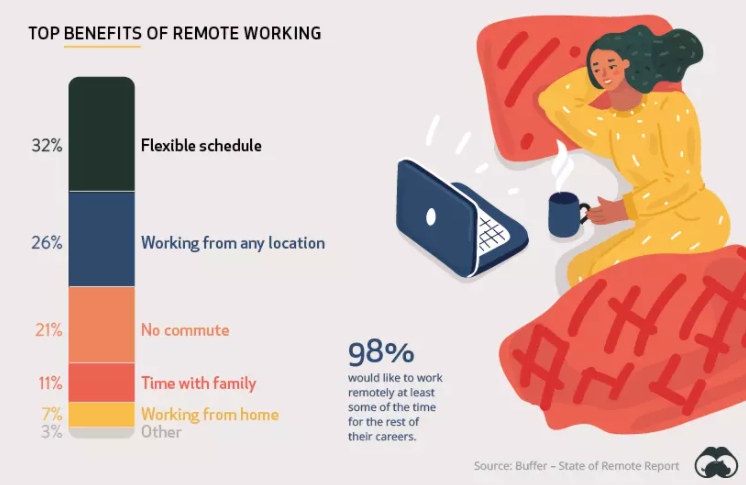
All Blogs
Remote hiring is not the future, but it’s a transition that we are already a part of. An unlikely concept a decade ago has become a reality, and hiring remote developers will be a necessity for corporate executives after the pandemic.
Aspiring startups and corporations are interested in remote employment. There are numerous benefits of remote hiring, starting from a greater talent pool to helping make better profit margins.
The number of firms hiring remote development teams is increasing every day, and we’ll discuss the reasons for this shift.
Why Remote Employment?
The employment of remote developers is not as difficult as it appears. On the contrary, it has real advantages such as fewer overhead expenses and increased productivity. Let's take a look at why so many businesses are getting in on the act.
Increased Productivity
Professionals work on their schedules and align them with the given deadlines. The convenience of working at your free will and deciding your timings bolsters the overall flexibility of the workforce.
Also, remote hiring enables you to find resources with rare and valuable skills to add that bling to your team. You can take on more technical projects and work on glamorous products because you simply can.
In addition, companies leverage the different time zones and get work done round the clock. It may be that a developer is deep in sleep in the U.S while another is writing some hot code in broad daylight in Pakistan.
Operating costs are lower.
The investments that small business owners make are very important. Hiring remote staff turns out to be a hack for minimizing future financial losses. For starters, an office manager will not be responsible for paying rent, electrical bills, employee benefits, or office management technology. That’s almost a quarter of the liabilities of any company.
A more diverse talent pool
On the other hand, remote employment does not confine HR managers' search for talent to a single location. The ability to screen applicants from all around the world provides access to competent professionals.
Risk aversion
It's simple to scale up or down a remote development team. You may start with a team of two or three developers to gauge how practical is the idea, and then expand to a team of ten, fifty, or even a hundred after validation!
Encourages excellent work habits
Remote work encourages teams to approach work more carefully and efficiently on a bigger scale. Written communication is important to remote work, and it's much easier to discuss changes and share reports and general guidelines.
Employers must exercise discipline and a sense of responsibility as a result of a lack of supervision. Also, every team member is expected to be a self-starter, seeking new ways to help the organization.

"The remote workers themselves do feel very much alive, as they get to work on their own pace and energy without any sort of stress and anxiety which eventually increases the productivity!
Even the W.H.O and World Economic forum vouches for this!"
Conclusion
In the modern age, the remote workforce has been a significant change driver. Small business owners gain the most as remote staff lowers operational expenses, makes talent sourcing simpler and offers employers a competitive advantage over teams that do not offer flexible work.
It's time to call it a day. I hope that this piece of information is sufficient to understand the importance of remote hiring. The epidemic isn't done yet, and it's time to get back to routine work, either from the office or remote.








.png)